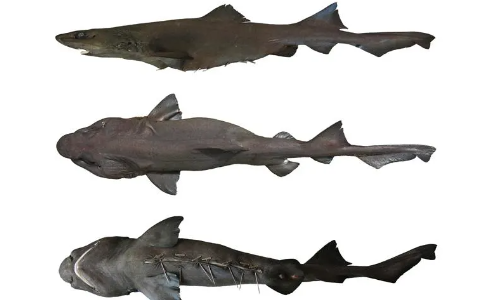New Deep-Water Shark Species Discovered in Kerala
At Sakthikulangara fishing harbor in Kerala, scientists from the Zoological Survey of India (ZSI) found a new species of deep-water dogfish shark. They named it Squalus hima. This new finding, which was published in the journal Records of the ZSI, helps us learn more about the different kinds of life that live in the Arabian Sea. Spurdogs are a type of dog in the genus Squalus, which is in the family Squalidae. These dogfish sharks are known for having smooth spines on their dorsal fins and can be found in many marine settings around the world.
Details of the Discovery
The team, led by Scientist Bineesh K. K from the Marine Biology Regional Centre of ZSI, did a lot of morphological, meridional, and morphometric research to tell Squalus hima apart from very similar species, like S. mitsukurii and S. lalannei. Some important ways to tell them apart are the number of vertebrates, the number of teeth, and the shape of the fins. The squalus hima helps us learn more about the variety of species that live along India’s southwest coast. Discovering this animal is very important for protecting the environment, especially since dogfish sharks are caught for their meat, fins, and liver oil. Cosmetics and drug companies are especially interested in liver oil because it is high in squalene.
About Zoological Survey of India (ZSI)
- Establishment and Purpose: Founded on July 1, 1916, the Zoological Survey of India (ZSI) is dedicated to the systematic survey, exploration, and research of India’s fauna. Initially established to promote zoological studies, ZSI is headquartered in Kolkata.
- Operations and Collections: ZSI operates 16 regional stations across India and houses over 5 million specimens in its repositories. The organization identifies, archives, and exhibits various animal specimens, contributing significantly to the understanding and preservation of India’s biodiversity.
- Conservation and Assessments: ZSI conducts environmental impact assessments of developmental projects to ensure biodiversity conservation. It also maintains and updates the ‘Red Data Book,’ which documents the conservation status of various species, playing a crucial role in species preservation efforts.
Economic and Environmental Impact
The find shows how important it is to find a balance between using the environment for business purposes and protecting it for future generations. Better control of sustainable fisheries and marine biodiversity can be achieved by learning about new species. This is especially true in economically important areas like the Indian EEZ.
Month: Current Affairs - July, 2024
Category: Science & Technology Current Affairs








